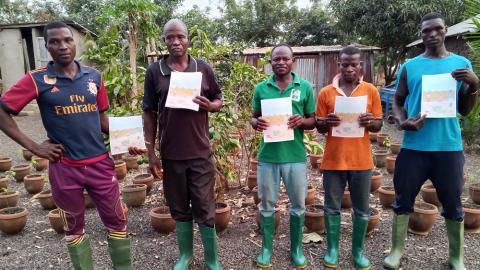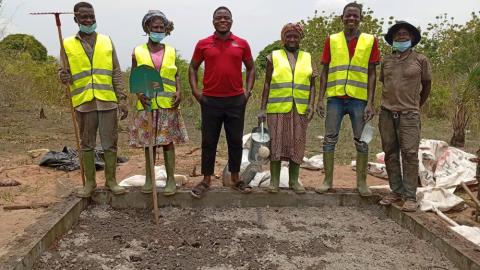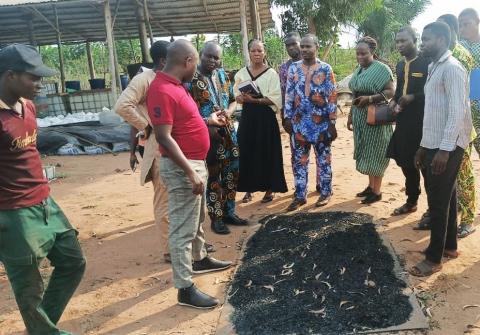
Launch of the climate-resilient agriculture programme: concrete action from 2025 onwards

Training in resilient farming practices in Togo. © Terre Bénie
ADA is launching its new climate-resilient agriculture programme in West Africa - mainly in Benin and Togo - to support smallholder farmers in dealing with the negative impact of climate change on agricultural production.
Although African countries are low emitters of greenhouse gases, they are among the most vulnerable to climate change, particularly in West Africa. This has a serious impact on rain-fed agriculture, which depends entirely on rainfall for its water supply. This vulnerability is associated with disruptions to the agricultural calendar, irregular rainfall and soil degradation, leading to a significant decrease in agricultural productivity and yields. As a result, small, family-run farms are increasingly suffering from unstable yields and have no access to the resources and financing that could help them cope with climatic hazards.
The aim of this programme is to support smallholder farmers in their transition to sustainable systems to enable them to adapt to environmental degradation.
A holistic approach
The transition to sustainable farming systems requires a collaborative approach. This is why the programme combines financial solutions with technical assistance in collaboration with microfinance institutions (MFIs), training and research centres, providers of sustainable agricultural solutions and farmers' organisations.
ADA's approach has two focuses: access to appropriate financial products and technical support, integrated into a ‘resilient agriculture kit’. The financial component consists of developing profitable investment and/or working capital loans with MFIs that are accessible and affordable for producers who adapt their production methods to become more resilient. The technical assistance includes training, timely access to the necessary quantity of high-quality inputs, demonstration fields and the promotion of innovative and sustainable farming practices.
Concrete actions from the outset
The following activities have already been put in place with a view to achieving the programme's objectives:
- Drawing up a technical guide for growing maize
A technical guide has been developed to help farmers adopt resilient farming practices, such as the use of improved seeds, compost production, mulching, agroforestry as well as adapted ploughing and ridging.

- Practical training in Togo
In February 2025, a training session was attended by 17 producers from four maize producer groups in the Haho Prefecture (Plateaux Region), organised by the Terre Bénie agroecological farm school in partnership with FUCEC-TOGO.
Using an approach combining theory and practice, the producers were trained in the use of light mechanisation (power tillers), compost production, maize growing techniques, storage, marketing and agroforestry practices.

- Capacity-building for four microfinance institutions
In Benin, four MFIs (COMUBA, MDB, RENACA and SIA N'SON) received training in January and February 2025. The training focused on the challenges posed by climate change, best resilient agricultural practices and the development of specific financial products to support the transition of smallholder farmers.

Scaling up and regional ambitions
The programme aims to support the transition to sustainable farming systems of 2.000 farmers in Togo by 2027. There are also plans to extend the programme to other countries in West Africa to meet the urgent need to increase the resilience of smallholder farmers.